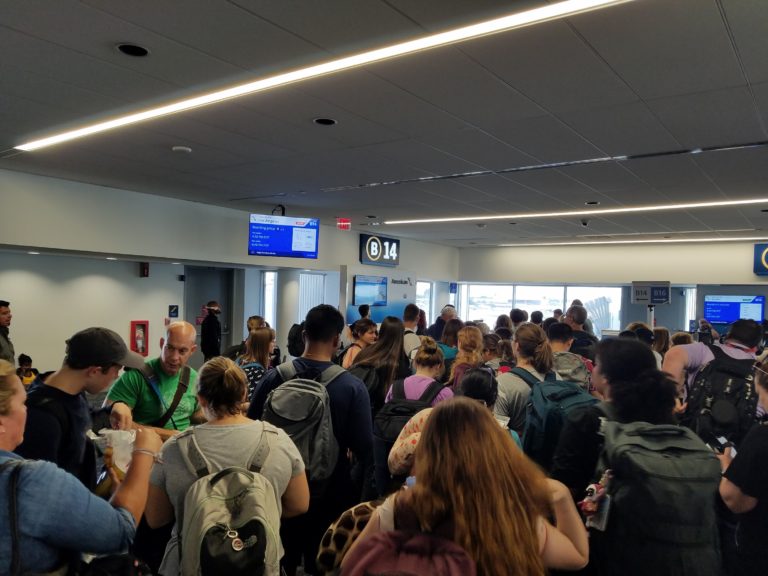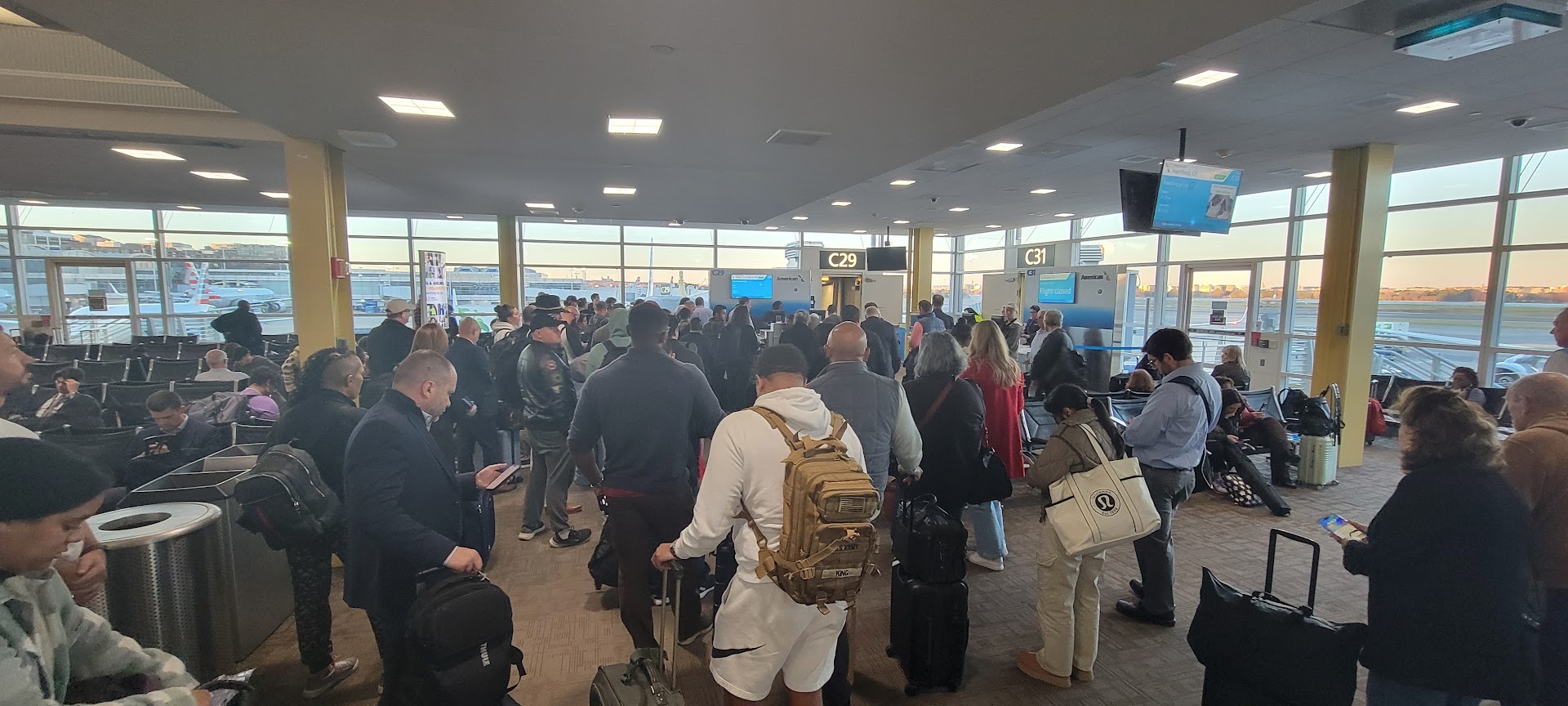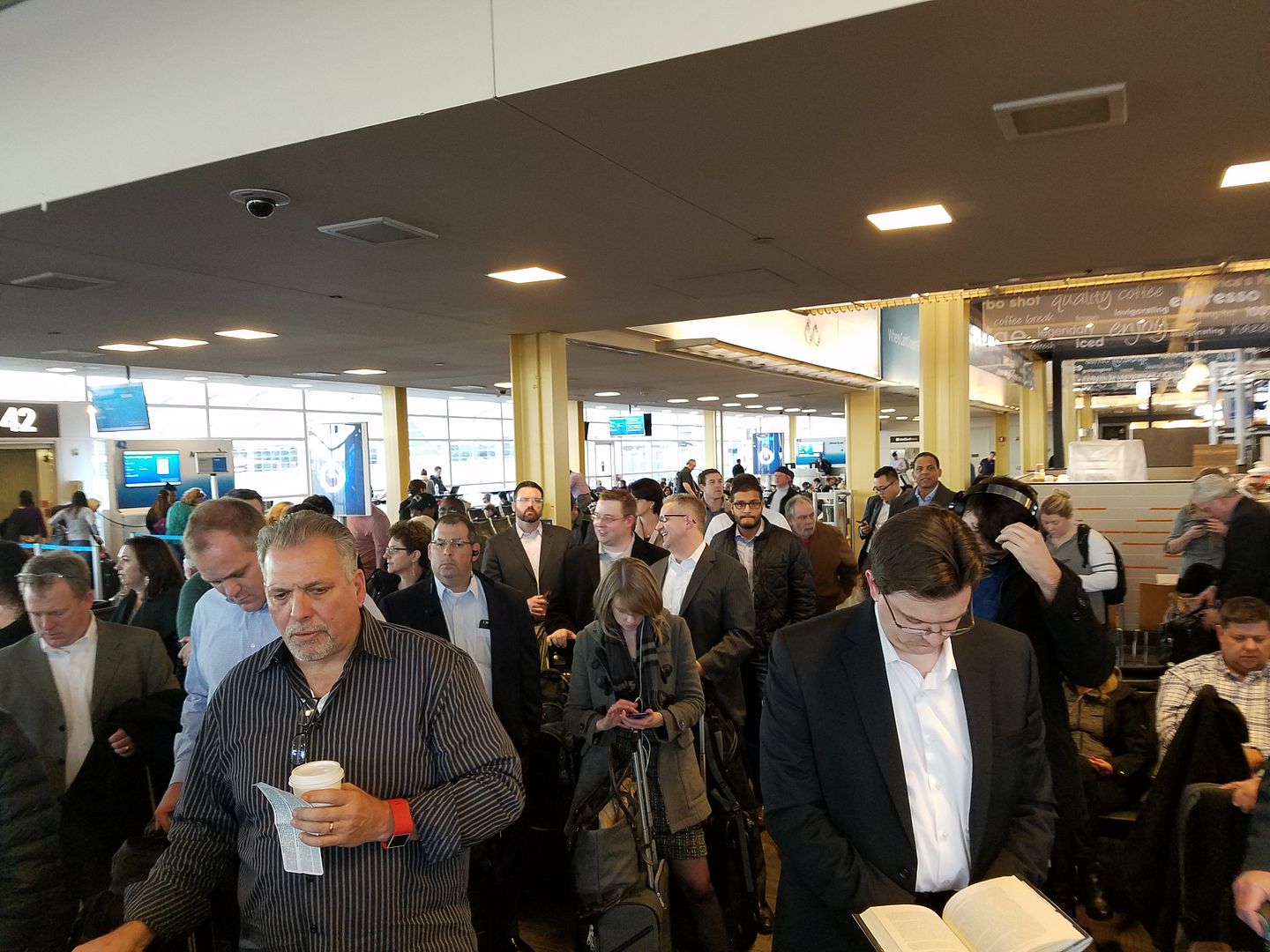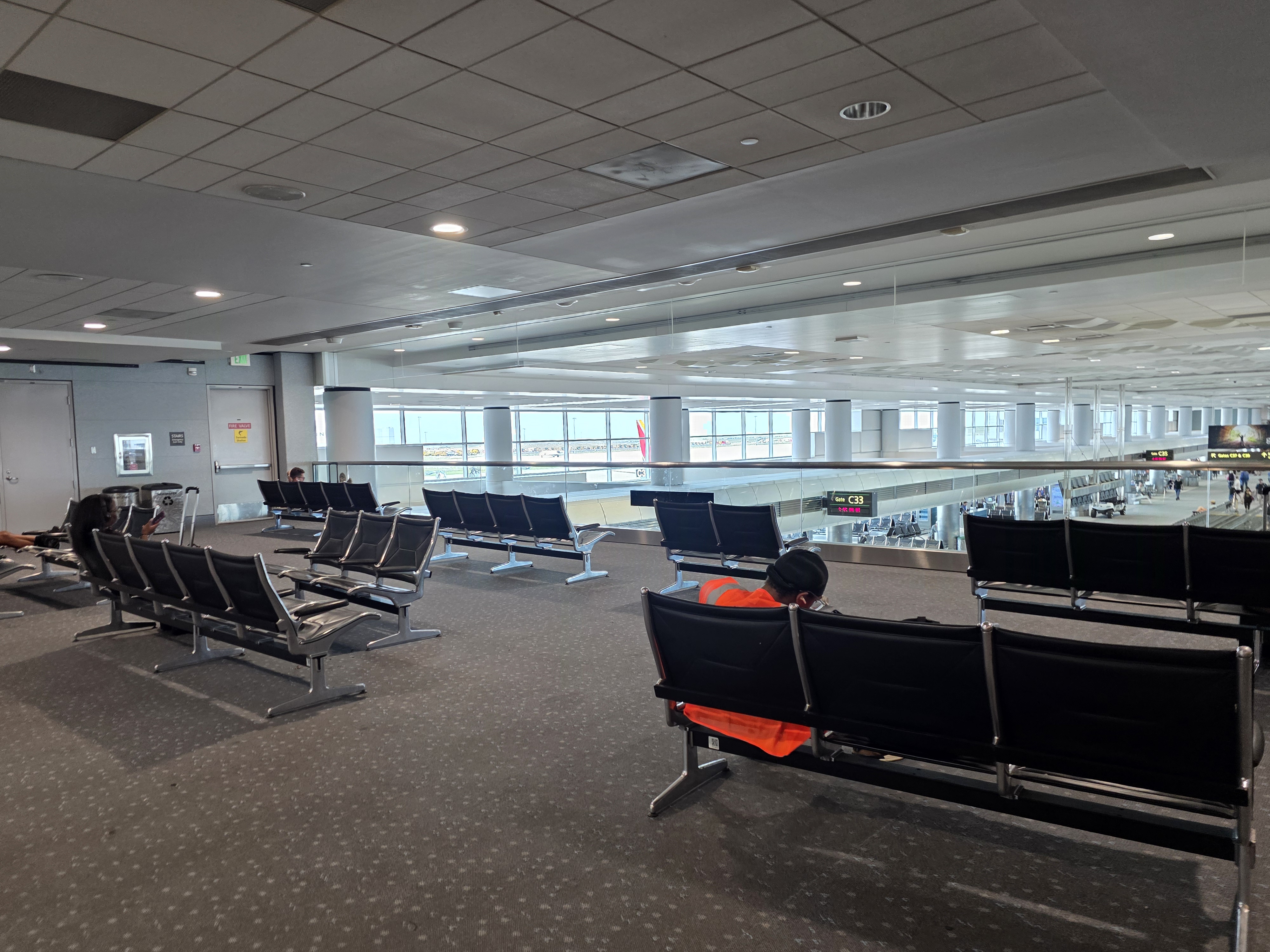Have a look at this American Airlines gate area, and how passengers are seated. There aren’t enough seats for customers, but those with seats use chairs beside them for their bags. So while individual passengers hog empty seats, other passengers are stuck sitting on the floor.
- Do bags take priority over people? Do you get two chairs, when there aren’t enough for others to have one?
- The seats are too close together, people often leave a seat empty or feel like there’s nothing available when they’d have to sit next to someone anyway. Sitting down next to someone in airport gate seating can feel intrusive.
- And why aren’t there ever enough seats?
When people at the airport terminal are sitting on the floor but your bags take priority.
byu/ardavis78 inmildlyinfuriating
If you want a seat where someone has placed there bag, just walk up to them and ask “Is anyone sitting here? Would you move your bag so I can sit?”
Of course some people would rather sit on the dirty floor than on the dirty chair sandwiched in between two other people while on the floor they can at least spread out.
If someone says the seat is “saved” you can even just take it anyway, promising to move when their companion shows up. Seat saving can be legitimate, maybe the other passenger is buying food or in the restroom, but that’s the perfect response to a seat saver who is lying.
The reason airport gates are crowded without enough seats isn’t an accident, though.
- Airports make money from concessions, not seating. Retail, food, and duty-free shops bring in rent, and airports usually take a cut of sales, so terminals are designed to maximize passenger flow into stores rather than leaving big gate areas for seating. (That’s why several airports, like DFW and Chicago O’Hare, actually removed moving walkways – since those caused passengers to speed past stores instead of wandering in.)
- Gates are expensive real estate, and busy airports push for high utilization. Multiple flights may be scheduled at the same gate within a short time, creating bursts of passengers far larger than the seating footprint was meant to hold.
- Passengers tether to gates. Even when other seating is available nearby, people want to sit right at the gate to be first in line, to hear announcements, or to watch the counter for standby and upgrade clearing. This creates crowding even if the terminal has plenty of total seating.
- Operational Irregularities. Delays, rolling cancellations, and missed connections keep more people in the gate area than expected. A gate designed to cycle one aircraft every hour may suddenly be holding three flights of passengers at once.
- Designed to planes with fewer seats and lower load factors. Many airports were designed decades ago, before load factors consistently ran in the 85–90% range and before planes were densified with more seats (11 years ago an American Airlines 737 had 150 seats, now it has 172). What was “enough” seating in the 1980s or 1990s no longer fits today’s packed cabins.

Charlotte airport

Charlotte airport
Not only that, but the seats aren’t configured for how people behave. And that means each seat doesn’t cover as many passengers.
- People put their belongings on seats because there’s nowhere else to put them. Even seats with a simple hook would obviate the need to use a seat for your jacket.
- People want personal space, and are reluctant to sit beside someone – so they often leave a space when sitting down. Sitting down between two people can be awkward, and those people don’t want it either which is why they spread out over into the seats beside them as though they’re saving space on a Southwest flight.

Washington National

Washington National
Airports mostly seem to have these same awful seats, everywhere you go as well.


Airport seating is built to withstand constant heavy use by thousands of people a day. Materials like metal frames and vinyl or leather-like upholstery are chosen because they’re resistant to spills, tearing, and easy to clean.
And they’re modular. Airports can install them in long rows, move them around, or swap out damaged sections without replacing the whole set. The look is intentionally generic. Airports don’t want trendy furniture that will look dated in five years. A neutral black/grey seat with metal arms “fits” anywhere from Miami to Minneapolis.


If I have to wait by a gate, I try to wait at gates that have cleared out with a departing flight or at an empty gate area that is maybe a a couple of minutes walk away.
@GUWonder — ‘This is the way.’
I love how all the US airports they don’t want anyone stretching out,so they all have my metal non removable armrests,when you travel international,Seoul for example there are no armrests so you can use it like a couch to rest,and they have plenty of seating,clean as well unlike American airports where gate areas are nasty
Sit across from your gate at an empty gate. Stay at the lounge until the last moment.
At some gates the row of seats are so close together that leaving your luggage on the floor prevents people from passing through.
As mentioned, lots of gates don’t have room for all the people that fit on the outgoing plane.
The trend for more comfortable seating at some airports (pods, cushy seats, etc.) also reduces the number of available seats in the gate area.
Mandalorian, “I have friends everywhere”, right?
Ending carry-on bags and limiting passengers to a single under-seat item would end a lot of this nonsense. Which is why it will never happen.
1. Most airport concourses are decades old and from an era of far fewer passengers. 2. Even most concourses built post 2000 (like MIA Course D) do not have enough seating 3. Airports want to “encourage” passengers to visit concessions instead and spend money. 4. Airports are no longer really about boarding and deplanning. They have become malls with a captive audience that just happen to be flying that same day.
I don’t leave the lounge till the boarding starts, but then either stand or sit at the gate I’m expecting to board at. If you are not right there, you cannot hear the announcements. Also, as a remnant of my being a resident of NYC, if there is a wait and an empty seat, I’m sitting in it. By the time I’m finished asking “is this your bag”, I will have already moved it and sat down.
Some y’all NEED to stand and walk more. Pudgie f*ks.
The advantage of having a non-hub as my home airport is that it is always easy to find a gate where no plane is scheduled for a nice stretch of time. Often, the empty gate area is in eyesight of the gate I’ll use. Get up when boarding starts, hit the head, arrive a the gate just as group 1 is boarding, and try to get through those in groups 4 and above blocking access.
Even a large airport like Manchester UK has very few seats and cramped boarding areas for international flights.
As far as hearing the announcements, even if you can hear them they often are so mush mouth and fast you can’t understand them. That is why you need to be close enough to see the board and watch what is going on. Airlines ought to give training in enunciation to gate personnel.
@Jan – so that’s why the Lager Louts hit the bars at 06:00. No room at the Jet2 gate!
The entire air travel industry is focused on their profits not on what paying customers need or want. We are just cargo with credit cards. Hence crowded planes, small seats, no leg room, no real concern for our comfort, time, or experience. They excel at not killing us, but that’s about it. The gate agents speak too quickly and are unintelligible, even if they don’t have accents that make it hard to understand them. Basically, we are treated like crap and try to carve out a little space in an inherently overcrowded and uncomfortable situation.
Redesign the seating with overhead bag storage and underseat storage just like the airplane. That gets the bags both off the floor and the middle seat AND serves as a defacto bag sizer. A passenger desiring a seat could just ask their fellow passenger to use the provided bin.
Airlines would even be able to circulate staff to identify and resolve oversized carryons before the boarding crunch.
@GUWonder — ‘Remember this: Try.’
The Tandem Sling Seating has an interesting origin story, as it was designed by Charles and Ray Eames in 1961 for ORD and IAD, when ORD terminal architect Eero Saarinen sought new designs for public seating, . The seating can be purchased with small tables between seats, that have USB and AC charging outlets and space to sit drinks or other small objects, but, as others have noted, airports have no interest in spending money to make passengers more comfortable.
I am no longer able to walk long distances so request a wheelchair to get to my gate. I would probably be more comfortable sitting in the gate seats but don’t because of the shortage of those seats. I am able to walk (very slowly) down the jetway, so they could keep the wheelchair.
More than once I’ve seen people stretched out over 4 seats at crowded gates while people had to sit on the floor. I suppose that’s why so many gates now have metal armrests between seats.
Sometimes, we’re our own worst enemy.
Also, Manchester does not have proper lounges.
In a world where every single detail of your life is monetized to the last penny, fight back. Bring garlic chicken from hime and proceed to eat it in the gate area, or inside the flight.
Eff the airports and the sheep who comply with their devious mind games.
And politely tell the gate agent that their airport experience sucks. Politely. They don’t have control over your experience but a few may pass on your message to the fat arches (sp incorrect) in their ivory towers.
I just stand right in front of these people. Usually they then move. Either the bags or themselves!
And if they don’t the entertainment value of making them uncomfortable and watching them squirm makes my day!
So glad I have multiple lounges I can use so I don’t have to be around the great unwashed at the gate. It’s bad enough we have to share the plane
Former FA and I absolutely hated seeing the aircraft cleaners leave their bags in the seating area as well as taking up 10-15 seats in between flights that passengers couldn’t use at crowded gates. Mostly in Denver. Passengers were sitting on the floor because of this. My concerns fell on deaf ears. No one seemed to care that bags were left unattended. I appreciate the cleaners had a job to do, but they need their own area to wait at in between flights and not take up valuable space needed by weary travelers.